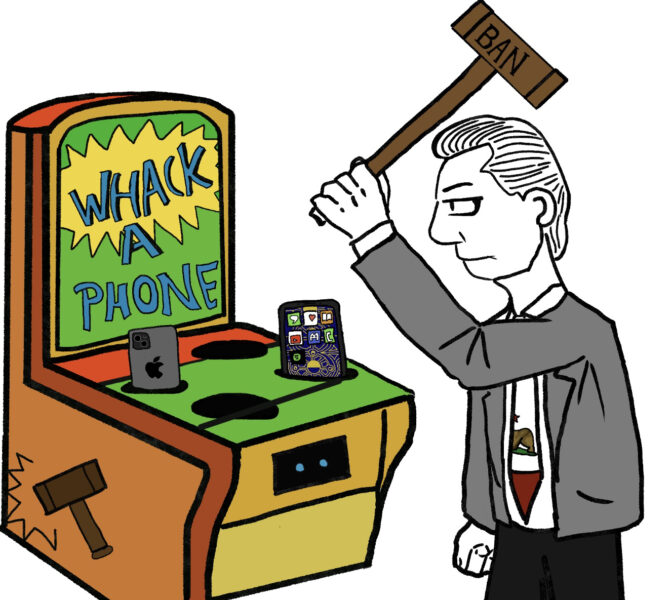
It’s hard to imagine the Phone Free School Act will benefit the education and social system in California. The act attempts to solve a key issue in California’s education and social system: the usage and distraction of smartphones in class. However, Newsom’s newly-signed legislation doesn’t cover all of the important aspects.
First, the law does not consider the positive aspects of phone use in classrooms.
“If I want to do a quick survey in class, it’s easier to use phones than it is to start up our school-issued chromebooks,” said Chemistry and AVID teacher Max Von Euw. “Our chromebooks are like 80-year-old people, they take a while to start up, and they take a while to get going”
Newsom’s legislation is met with lots of concern from parents. According to the National Parents Union, the majority of parents, 56%, want their children to have access to their phones during the school day.
“God forbid there is an emergency, and kids need to contact home, and their phone is locked in a [Yondr] pouch … it can get frustrating.”
“Parents are [creating] this backlash because they want to be able to contact their kids in the case that something happens,” said junior Noel Padilla. “If they can’t [stay in contact], there’s going to be a lack of communication.”
In addition to the necessity of staying in contact because of an issue at home, it’s arguably more important to stay in contact due to potential dangers at school. According to the CNN school shootings database, the number of annual school shootings in the United States has increased by 112% since 2021. With this staggering statistic, it only makes sense for parents to be concerned.
“God forbid there is an emergency, and kids need to contact home, and their phone is locked in a [Yondr] pouch … it can get frustrating,” Von Euw said.
The Yondr pouch is a device that magnetically locks a student’s phone in a pouch. Though Yondr pouches aren’t the only option to abide by this legislation, the act indirectly encourages schools to consider the pouches as a viable choice. Some will inevitably make the switch.
Though the bill mandates that phones be accessible in the case of an emergency, it will be very difficult to guarantee this. Due to the limitation of time and other circumstances that come with the threat of danger, having 35 students individually unlock a pouch to access their phones seems ineffective and frankly dangerous.
“If people can’t get [the Yondr pouches] open the normal way, they’re gonna break them open,” Padilla said. “And breaking the pouches open proves that you have to take an extra and unaccounted step just so you can have access to your phone in the case of an emergency.”
Phones are a prominent and possibly hazardous aspect of society, however, the state strives to treat the symptom with this legislation rather than the disease: phone addiction.
“If you teach a kid early on that a phone is more of a tool rather than a piece of entertainment, it could be really beneficial because they can learn how to regulate [phone usage] on their own,” Padilla said.
The country has started to address phone addiction by cracking down on predatory social media. On April 24, President Joe Biden signed a law that will potentially have TikTok banned under some circumstances. The usage of TikTok has proven to be harmful to child development as the app is constructed to be addictive. However, this legislation isn’t an outright ban on TikTok, and the ban will only happen if terms are not met by Jan. 2025. Though this is a step in the right direction, more effort has to be put in to solve phone addiction.
Due to the lack of effectiveness of Newsom’s legislation, it’s important to cover other possibilities that will solve the issue of phone distraction in a more efficient and safe manner.
Though the idea is well-intentioned, the Phone-Free School Act’s execution needs to be overhauled. From the minor inconveniences of not having access to phones in class to the major concerns of child safety from parents, it is evident that the Phone-Free School Act is in need of substantial changes and revisions.



